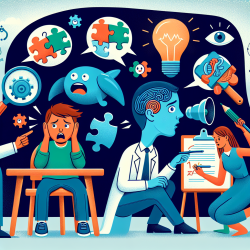As a practitioner dedicated to improving outcomes for children, it is crucial to stay informed about the latest research and its practical applications. A recent study titled Autonomic Dysregulation in Child Social Anxiety Disorder: An Experimental Design Using CBT Treatment provides valuable insights that can enhance your practice, particularly when dealing with children diagnosed with Social Anxiety Disorder (SAD).
The study conducted by Asbrand et al. (2022) examined the physiological responses of children with SAD to social stress and the effects of Cognitive Behavioral Therapy (CBT) on these responses. Here are some key findings and how they can be implemented in your practice:
Key Findings
- Blunted Heart Rate Reactivity: Children with SAD exhibited lower heart rate reactivity compared to healthy controls during social stress tests.
- Elevated Sympathetic Arousal: Children with SAD showed higher levels of tonic sympathetic arousal, as indicated by skin conductance levels.
- Lower Parasympathetic Arousal: Baseline measurements indicated lower parasympathetic arousal in children with SAD.
- No Significant Change Post-CBT: The study found no significant physiological changes in children with SAD after undergoing CBT compared to a waitlist control group.
Practical Applications
Based on these findings, here are some strategies you can implement to improve outcomes for children with SAD:
1. Comprehensive Assessment
Incorporate physiological measures such as heart rate variability (HRV) and skin conductance levels (SCL) into your assessment protocols. This can provide a more holistic understanding of a child's anxiety levels and autonomic functioning.
2. Tailored Interventions
While CBT is effective in reducing symptoms of anxiety, it may not significantly impact physiological arousal in the short term. Consider integrating additional techniques such as biofeedback or mindfulness-based interventions that specifically target autonomic regulation.
3. Long-term Monitoring
Given the study's findings on the stability of autonomic dysregulation, ongoing monitoring of physiological responses can help in assessing the long-term effectiveness of interventions and making necessary adjustments.
4. Encourage Further Research
Encourage collaboration with researchers to explore new treatment modalities that could address both cognitive and physiological aspects of SAD. This can lead to more comprehensive and effective treatment plans.
Conclusion
Incorporating the insights from this study into your practice can lead to more effective interventions for children with SAD. By using a combination of comprehensive assessments, tailored interventions, and long-term monitoring, you can better support these children in managing their anxiety.
To read the original research paper, please follow this link: Autonomic Dysregulation in Child Social Anxiety Disorder: An Experimental Design Using CBT Treatment.










